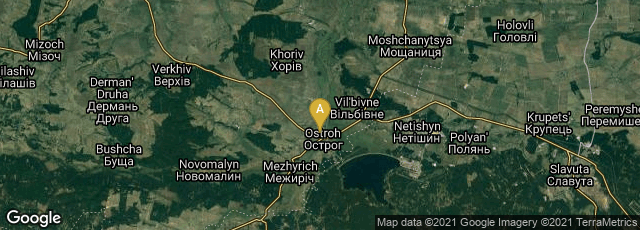

A: Ostroh, Rivnens'ka oblast, Ukraine
In 1580 Ivan Fyodorov (Fedorov or Fedorovych; Russian: Iва́н Федоров) printed the first complete Slavic Bible. Fyodorov's book is known as the Ostrog Bible (Ukrainian: Острозька Біблія; Russian: Острожская Библия), because it was printed on the estate of the Ukrainian/Lithuanian prince, Konstanty Wasyl Ostrogski (Belarusian: Канстантын Васiль Астрожскi; Lithuanian: Konstantinas Vasilijus Ostrogiškis; Ukrainian: Костянтин-Василь Острозький) at Ostrog (Ostroh) Ukraine.
"The Ostrog Bible is unique among Church Slavonic Bibles in that the Old Testament was translated not from the (Hebrew) Masoretic text, but from the (Greek) Septuagint. This translation, comprising seventy-six books of the Old and New Testaments, was based on the Gennadius Bible and a manuscript of the Codex Alexandrinus. Some parts were based on Francysk Skaryna's translations.
The Ostrog Bibles were printed on two dates: 12 July 1580, and 12 August 1581. The second version differs from the 1580 original in composition, ornamentation, and correction of misprints. In the printing of the Bible delays occurred, as it was necessary to remove mistakes, to search for correct textual resolutions of questions, and to produce a correct translation. The editing of the Bible detained printing. In the meantime, Fyodorov and his company printed other biblical books. The first were those which did not require correcting: the Psalter and the New Testament.
"The Ostrog Bible is a monumental publication of 1,256 pages, lavishly decorated with headpieces and initials, which were prepared especially for it. From the typographical point of view, the Ostrog Bible is irreproachable. This is the first Bible printed in Cyrillic type. It served as the original and model for further Russian publications of the Bible. The importance of the first printed Cyrillic Bible can hardly be overestimated. Prince Ostrogski sent copies to Pope Gregory XIII and tsar Ivan the Terrible, while the latter presented a copy to an English ambassador. When leaving Ostroh, Fyodorov took 400 books with him. Only 300 copies of the Ostrog Bible are extant today" (Wikipedia article on Ostrog Bible, accessed 01-03-2010).